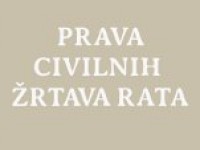Publication "The rights of civilian war victims"

More
than twenty years since the war began, during the research we conduct, we ask
you just a simple, human question - "how today live thos who suffered during the war?". And, without any particular reason, one could ask "how my neighbours lived through the war and in this days?". It is especially difficult for families more than 1,800 missing persons whose fate is still not solved. Working
on the research facts about all the victims of war and record personal
memories, we asked ourselves how the institutions and society recognize
their suffering? How
often provide opportunities to share their memories of the closest
family members are interested say more than 22,000 of those killed? We wonder how the trauma of carrying detainees and prisoners of the camp and that they lack the kind of support? What should those who have survived sexual violence? How do you navigate all of whose houses were destroyed?
We
believe that all the relevant institutions should ask ourselves what
kind of support to provide victims and critically evaluate their past
work. The
extent to which legal framework traced in 1992, which regulate the issue
of compensation for damage suffered during the work of members of the
JNA and Serbian forces, still meets the needs? Can
legislators really ignore the demands of successive association of
survivors to better regulate the status of parents of children killed?
In
a failed attempt to solve the problem of casualties due to actions by
members of the Croatian forces and by unknown perpetrators, the Croatian
Parliament in 2003 issued
pursuant to the laws which have been damaged sued the Republic of
Croatia in more than 70% of cases, the rejection of claims that lost the
litigation costs of litigation have to pay. Is
it ethically acceptable to the families of those killed more punishing
toll of high litigation costs, rather than to finally acknowledge their
suffering?
To craft a proposal of reparations / compensation, Documenta decided to research the needs of civilian victims. We will implement it through interviews with victims with additional interviews with decision makers. In his previous work, we saw that for the survivors and victims still remains an open question how to heal wounds. It is especially difficult when there is no recognition of the suffering of all victims. We are working on the trail of the right to truth, justice, compensation, and guarantee to non repetition of crime. We
believe that every victim and the victim has a right to timely and
adequate support from the moment of committing crimes and damages.
That's
why we have edited and published the publication "The rights of
civilian victims of war" in which we analyze current practices and
legislative framework, and we deal with all forms of suffering and
casualties in the war - non-pecuniary damages for the death of a loved
one, disability caused by war activities, sexual abuse as a visual execution of war crimes, casualties from mines, compensation for property destroyed by terrorist acts ...
The
publication "The rights of civilian victims of war" is part of the
affirmation of the right to compensation for all civilian victims of
war, which document is carried out with support from the Open Society
Institute, and you can find it among other publications.




